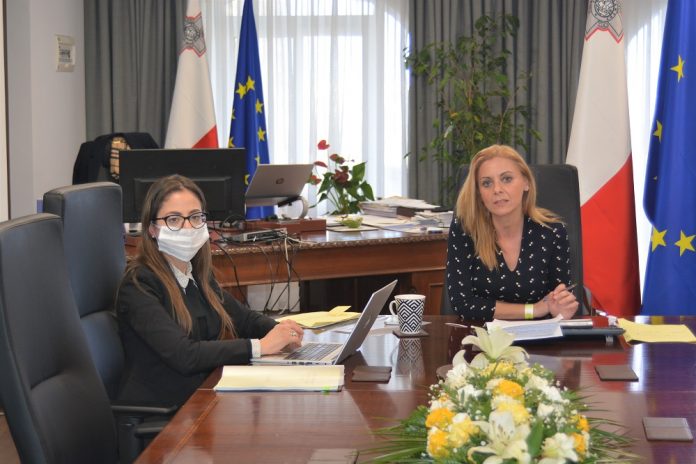Minister for Education Justyne Caruana actively participated in the informal videoconference of the Ministers for Education of the European Union, during which she emphasised the importance of further mainstreaming the notion of equity in the provision of education, both in compulsory schooling and in higher education.
The conference discussed the concept of equity in education and training, an important topic that merits greater attention, particularly in light of the difficulties brought about by the Covid-19 pandemic.
Minister Justyne Caruana said that, “Malta prides itself on distinguishing, both in policy and in practice, between an equal education and providing equitable access to education for all children and students throughout their educational paths”.
Fostering the notion of equitable access to education will provide us with a better understanding of the needs of our students. By using equity as a yardstick, gaps in education and training can be more easily identified and therefore provided for. An equitable and inclusive education promises to prepare a cohort of students ready to fully engage and succeed in emerging market economies, and resilient to arising challenges.
Minister Caruana said that, in this regard, Malta prioritises equity in both compulsory schooling and further education. Indeed, we have taken concrete steps to fully integrate this notion. She said that a case in point is the recent launch of an online Mapping Tool, which supports educators and other professionals in their planning. This tool keeps a record of specific targets, success criteria and strategies, with the aim of designing and mapping support services and individual educational plans of high quality. Additionally, Autism Friendly Guidelines have been launched to improve the school environment for all.
Furthermore, with the launch of the Inclusion Policy 2021 – 2030, Malta has aligned itself with SDG Goal 4 and the European Education Area priority area 2, in order to reinforce and strengthen its provision of educational services to improve the full participation of students with different learning abilities.
The Minister for Education said that, while investments in education and training must be paralleled with the emerging needs of our economies, equal considerations must be invested in giving children the right tools, thus enabling them to fully compete in different markets and sectors.
Malta is of the opinion that further investment is needed, also through inclusive measures, to support learners in accessing a comprehensive education system, as well as educators in delivering quality education to all.
The Minister continued that it would also be remiss of member states and the EU to ignore the ramifications arising from Covid-19. It is our responsibility to ensure that all students and children, particularly those most vulnerable, have an equitable access to high-quality education, which prioritises and caters for their needs. This would go some way in ensuring that all are able to participate fully in education and training and that none are left behind.
Spearheading an EU-wide effort for assessing and supporting the mental wellbeing of all schoolchildren during this critical period of COVID-19 pandemic and beyond would also be beneficial in ensuring a better quality of life.
Minister Caruana said that she encourages more comprehensive transdisciplinary communication amongst member states in this area.
The conference also discussed the strategic framework for European cooperation in education and training towards the European Education Area and beyond (2021-2030).
Minister Caruana said, “Malta believes that through EU-wide efforts, standards for education and training can indeed be strengthened and reinforced, reaffirming our collective commitment to deliver an educational model based on excellence and inclusivity. Malta thus welcomes the overall ambition expressed in the Strategic Framework for European Cooperation in education and training”.
She said that Malta’s commitment to addressing gaps in education remains a high priority, and that we have strived to provide continued and targeted assistance to all of our students. She explained that Malta, in particular, is focusing its efforts on; ensuring that students are digitally equipped to face modern-day challenges; and encouraging and promoting further participation in early childhood education and life-long learning.
Minister Caruana said that, in fact, Malta has exceeded the Europe 2020 national target by 5.1 percentage points. Malta’s tertiary education attainment has also registered a gradual year-on-year increase since 2015 and now stands at 38.1%. However, Malta wishes to stress the importance of adopting educational standards and models which best befit member states’ specific needs – a model which recognises achievements and good practices rather than adopting a ‘one size fits all’ approach. The standards should serve to incentivise and encourage member states.
She said that a case in point is the area of early school leavers, where it was a pleasure to report that Malta’s efforts for a more pertinent education system have yielded a steady decline in early school leavers from 21.7% in 2012 to 17.2% in 2019. With regards to early school leavers, Malta has witnessed a gradual but constant decline year on year, registering a higher rate of decrease than in the EU. However, such achievements are unfortunately not reflected in the targets highlighted in the Resolution.
Whilst Malta does not have any objections specific to the percentage point being proposed for this target, we stress the importance of an open discussion on the methodology used for the new targets, as well as for future ones.
Malta favours a methodology which is reflective of the high standards the EU wishes to set, one which recognises national achievements and is respectful of the different yardsticks adopted across the EU.
In conclusion, Minister Justyne Caruana reiterated Malta’s commitment to be an example of good practice, for the promotion and provision of an educational system which is truly able to cater for the needs of all its students, which through national efforts and planning, and by aligning itself with the EU strategic framework that is reflective of all EU member states’ realities, it is set to achieve.
Photo: MFED










